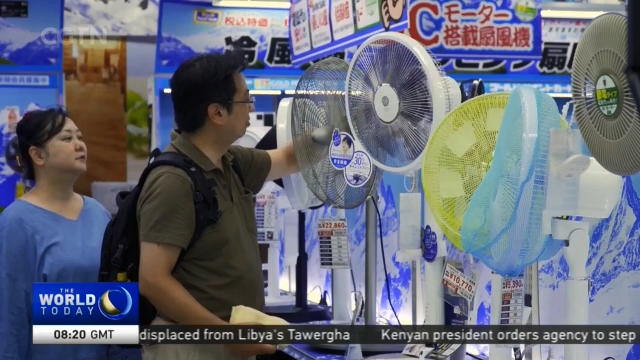
17:17, 19-Aug-2018
Japan Heatwave: Extreme summer temps boost air-conditioner sales
Updated
16:24, 22-Aug-2018
02:21

Summer may be drawing to a close in much of Asia. But in Japan, a rash of heatwaves that has killed dozens this season is continuing to drag on. Our reporter Terrence Terashima explains how the extreme weather is giving one sector of Japan's economy an unexpected boost.
Japan has been suffering from irregular weather patterns this year, which brought bursts of torrential rains and a record-breaking heat wave to the country.
The deadly heat wave killed over 130 people and led to the country's hottest July on record.
Japan's meteorological agency said the temperature in eastern areas was 2.8 degrees Celsius above average. While a city just north of Tokyo saw a historical high of 41.1 degrees.
On July 23rd, the temperature in Tokyo climbed to 39 degrees, triggering 3,383 calls to ambulance services in a single day, a record high.
The Japanese fire service said its ten highest daily call tallies were all recorded this year between mid-July and August 4th. But the scenario's not all bad. Shops and businesses have seen sales of beverages and electronic appliances increase.
YASUYUKI KATSUTA, HOME APPLIANCES CONCIERGE AKIHABARA BRANCH, YODOBASHI CAMERA "The temperature rose really high, soon after the rainy season ended, so there were long spans of hot weather. We have seen a 20 percent rise in sales from the average for this period of the year."
Sales of air-conditioners and refrigerators also rose, as people sought more powerful or new models.
YASUYUKI KATSUTA, HOME APPLIANCES CONCIERGE AKIHABARA BRANCH, YODOBASHI CAMERA "I would advise people to buy appliances that suit the size of the room or their needs. Too big or too small would only cause more problems."
On the days the mercury crept above 35 degrees, electricity demand rose more than 90 percent. Some areas hit as high as 97 percent, causing local electricity utilities to borrow from neighboring districts' supplies.
TERRENCE TERASHIMA TOKYO "This hot weather is likely to continue into the following months and the electricity demand is expected to remain high. Ironically, Japan is still caught up in the dilemma of whether to use nuclear power or costly, polluting fossil fuels to provide the nation's electricity supplies. Terrence Terashima, CGTN, Tokyo."

SITEMAP
Copyright © 2018 CGTN. Beijing ICP prepared NO.16065310-3
Copyright © 2018 CGTN. Beijing ICP prepared NO.16065310-3